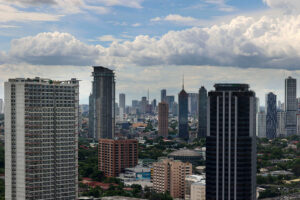By Luisa Maria Jacinta C. Jocson, Reporter
LOWER INTEREST RATES will help drive the entry of more foreign direct and portfolio investments into the Philippines, analysts said.
“The outlook for foreign direct investment (FDI) and foreign portfolio investment (FPI) in the Philippines appears promising, with current trends suggesting the country could meet or potentially exceed the Bangko Sentral ng Pilipinas’ (BSP) targets,” Security Bank Corp. Chief Economist Robert Dan J. Roces said in a Viber message.
The BSP expects to record FDI net inflows of $9.5 billion this year. For foreign portfolio investments, it forecasts $3.1 billion in net inflows by yearend.
“The BSP’s forecast for the year sounds reasonable, as it wouldn’t be too far a stretch, with that sort of level of annual FDI coming into the Philippines almost consistently over this period, barring the coronavirus-hit year in 2020,” Pantheon Macroeconomics Chief Emerging Asia Economist Miguel Chanco said in an e-mail.
In the January-to-May period, FDI net inflows jumped by 15.8% year on year to $4.024 billion, data from the BSP showed.
Meanwhile, short-term foreign investments yielded a net inflow of $1.46 billion in the January-July period, surging from the $157.3-million net inflows in the same period a year ago.
FDIs are considered long-term investments, while portfolio investments or “hot money” are seen as more fickle due to the ease by which these funds enter and leave the economy.
Ruben Carlo O. Asuncion, chief economist at Union Bank of the Philippines, Inc., said the BSP’s investment targets are doable amid easing interest rates.
“Offering attractive rates will be the key. All around will be declining key rates, thus, offering sensible investments now will lock in gains for prospective investors. I would like to believe that there is time,” he added.
Mr. Roces said the further reduction in policy rates this year and next year “should stimulate investment activity, particularly for FDI, by making borrowing more attractive.”
At its August meeting, the Monetary Board cut rates for the first time in nearly four years or since November 2020. It reduced borrowing costs by 25 basis points (bps), bringing the benchmark rate to 6.25% from the previous over 17-year high of 6.5%.
The central bank could also deliver another 25-bp rate hike in the fourth quarter, BSP Governor Eli M. Remolona, Jr. said earlier.
The US Federal Reserve is expected to start its easing cycle later this month, which also bodes well for investor sentiment, analysts said.
“The biggest catalyst for FDI and FPI into the country is the expected series of Fed rate cuts that could be matched locally, thereby leading to improvements in global investments, trade, and other economic activities,” Rizal Commercial Banking Corp. Chief Economist Michael L. Ricafort said in a Viber message.
Apart from reduced borrowing costs, analysts said that the country’s strong macroeconomic indicators will help attract more investments.
“Key drivers for achieving these targets include sustained economic fundamentals, political stability, an improved regulatory environment, ongoing infrastructure developments, and the country’s competitive advantages in sectors like BPO (business process outsourcing) and manufacturing,” Mr. Roces said.
Mr. Asuncion said investors are likely to be attracted to the Philippines because of its upbeat economic growth.
“If foreign investors see real opportunity in investing in the Philippines, I do not think it will be a huge problem getting these investors on board,” he added.
The Philippine economy grew by 6.3% in the second quarter, marking the fastest growth in five quarters or since the 6.4% in the first quarter of 2023.
On the other hand, Leonardo A. Lanzona, Jr., an economics professor at the Ateneo de Manila University, said that lower borrowing costs may favor short-term investments over long-term ones.
“The low interest rates of BSP can stimulate economic activity. However, this can only boost short-term investments as borrowing becomes cheaper,” he said in an e-mail.
“It can depress long-term investments if the returns on longer-term projects are deemed insufficient relative to the risks.”
Mr. Chanco also cited risks to this investment outlook, noting the country’s “policy stasis.”
“The Philippines’ nearest neighbors and biggest competitors remain quite aggressive in their pursuit of more open trade borders and a better infrastructure environment for businesses, something that the Philippines is still struggling with,” he added.
The government’s policies may also benefit short-term investments, Mr. Lanzona said.
“Also, the government implements policies or incentives that encourage immediate spending or investment, such as tax breaks or stimulus checks. These policies can boost short-term investments but may not have the same impact on long-term projects that require sustained funding and are subject to continuous risks,” he said.
Mr. Ricafort also noted that the investment targets remain achievable, barring any further geopolitical risks.
“However, global economic conditions and exchange rate stability will also play crucial roles. While the current trajectory remains positive, risks such as geopolitical uncertainties and domestic policy changes will have an impact on these projections,” Mr. Roces said.
Mr. Ricafort also noted that the country’s improving credit rating outlook will also support foreign investment growth by boosting the confidence of international investors and creditors.
Japan-based Rating and Investment Information, Inc. last month upgraded the Philippines’ investment grade rating to “A-.”
The country also secured an “A-” rating from the Japan Credit Rating Agency but has yet to secure an “A” rating from the “big three” credit raters.
The Philippines currently holds a “Baa2” rating from Moody’s Ratings, “BBB” from Fitch Ratings, and “BBB+” from S&P Global Ratings.
The government is targeting to achieve an “A” rating by the end of the Marcos administration.


















